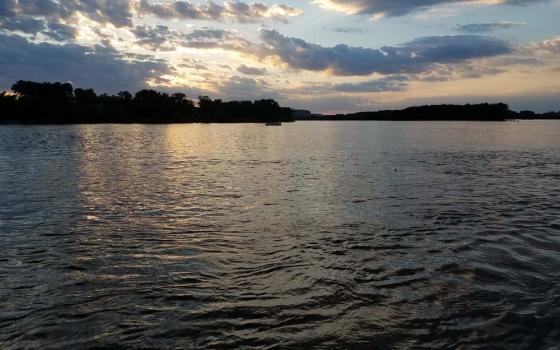I am on the shore of the Mississippi River. I can't see into the water in this light. I can't see the bottom of the river, or much more than the movement of the surface and the reflection of sky bright upon the ripples and waves.
I know something of this body of water, its power for life and destruction, its broadness and strength — but I've never before encountered these particular droplets joining together into the one mass that flows in front of me. It is at once so familiar and completely new.
I've never traveled to the source of this mighty stream nor to its end. I only know a slice of this water. I've crossed this river hundreds of times, but only a section, really — the bridges between the Twin Cities and Dubuque. This region — often called the Upper Mississippi Valley — feels most like home to me, compared to any other place I have been.
The presence of this stream during different eras of my life has convinced me I know this river well, has put me into relationship with it, has established an affection for it within me. Only reluctantly, awkwardly, can I admit that I can only know part of this great river: much of its vastness and force will forever remain a mystery to me.
Sometimes I think I know God. I can easily make big proclamations about who and what God is and isn't. I arrogantly inflate my knowledge, and often try define or explain God to others — in the same way I falsely think I know the Mississippi River.
But I haven't actually experienced the whole of the Mississippi River, and likely never will. And I will never know all of God. The vastness of God shrinks me.
Sometimes I think I know people. I can easily judge and decide what type of person somebody is by their dress or mannerisms, occupation or preferences. If they don't vote or think or pray like I do, then they must not be good friend material. If they ever hurt or disappoint me — I shrink the potential or possibility for a future bond between us.
Only reluctantly, awkwardly, can I admit that I can only ever experience a part of a person — and much of them will forever remain a mystery to me.
At this juncture in history, when the tendency of the human mind is to sort and categorize, to label and judge, the Spirit prompts us to abandon our definitions. It's a good time to strip away the trappings of difference, to drop the masks and costumes that cover our chances for communion. With all our coverings on the cutting room floor, we can then be free of anything that causes us to make others into enemies instead of friends.
Weeks ago, during Mass on Pentecost Sunday, I heard the Gospel proclaimed. The good news was that the risen Jesus joined the disciples who were behind a locked door, and told them twice, "Peace be upon you."
As I listened, my imagination put me in that room right with all the other disciples. I interrupted Jesus, my critical mind thinking overtime. "What do you mean by peace, Jesus?" I wanted analysis, explanations. I wanted clear definitions.
Jesus gently put his hand on my shoulder. He calmed me and spoke a thousand words through one simple gesture of love. The answer to every question I'm trying to ask is being powerfully present.
I heard of dark matter before I got engrossed in a PBS Nova documentary the other night, but I had no clue what it was. As I listened to the scientists describe the mystery of the force, the force that pulls and connects and fills in gaps in the universe, I discovered that they don't have a clue what dark matter is either.
One scientist, Marcelle Soares-Santos, said that she, along with other scientists, are "trying to figure out something that we have no idea what it is." I say the same thing about God. Good theologians likely would say the same thing about their work.
Maybe when it comes God, and people, and the mysteries of the universe — I need to stop pretending I know anything. Maybe the only thing I am called to do is learn how to relate to the mystery. I suspect the proper gesture in this relationship is not interrupting with questions — it is probably better for me to lovingly listen, or bow in submission.
The force that connects the universe is a mystery, and nobody knows what principles guide it. Although there is much that is clear and definable and principles that are certain, these truths coexist with that which we cannot see or identify.
I've been thinking, lately, that it could be the same with humanity, with our call to relationship. Whenever a person is defined, categorized and made into an "other," we are ignoring what is real about them. We are avoiding seeing their fullness, their hidden goodness.
What is it about our humanity that insists on stunting our openness to possibility and growth? Perhaps we can only feel confident when we are under the illusion that we know and understand. Perhaps sticking others into tidy containers is one way we try to control and navigate the mystery.
I don't remember where I heard it or where I read it, but it's been rattling around in my mind a lot lately that the healthiest and holiest people are the folks that are conscious of the power of paradox. These good ones can love those they disagree with and want goodness for those who have harmed them. They are the saints who can hold two contradictory truths together, who aren't threatened by inconsistencies.
I wonder how different our church and our world might be if we were taught from a young age that prayer is a type of communion with the mystery, that it is the practice of embracing opposing truths as they coexist. Opening ourselves to seeing every side and knowing we will forever be limited in our knowing is another way we can touch the cross of mystery; it is a way we get to put our fingers into Christ's side.
Back at the Mississippi River, I think of Jesus and our connection on Pentecost Sunday. His calming gesture assures me I don't need to know, that mystery ought to be a place where I am at home, at peace. His love invites me to move out of my head and to live fully from my heart. After all, my heart knows mystery is not a threat, but an awesome place to pray.
[Julia Walsh is a Franciscan Sister of Perpetual Adoration, a retreat presenter and a blogger who can be found online at MessyJesusBusiness.com.]

